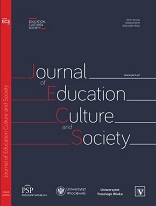Learning Continuity during COVID-19 Pandemic using the Virtual Classroom – A Cross-border experimental Multi Case Approach
Learning Continuity during COVID-19 Pandemic using the Virtual Classroom – A Cross-border experimental Multi Case Approach
Author(s): Khandakar Kamrul Hasan, Debarshi Mukherjee, Mahasweta SahaSubject(s): Education, Sociology of Education
Published by: Fundacja Pro Scientia Publica
Keywords: Virtual Classroom;e-Learning;Blended Learning;Design Thinking;Learning Gain;
Summary/Abstract: Aim. The global pandemic of the COVID-19 outbreak and the subsequent nationwide lockdown have put the endeavours of both academicians and students to the test. The disruptions are even visible in andragogical approaches across higher education institutions both nationally and internationally. Two government-funded universities in India and Bangladesh have decided to explore avenues to switch to an alternative e-platform overcoming the challenges of traditional classroom teaching. The business management faculties of both universities exercise blended learning modules using a design thinking approach. Methods. This exploratory case study involves university students and teachers reflecting the knowledge delivery mechanism in a collaborative online workspace called Virtual Classroom. The authors have adopted the case method to identify evidence-based practices to improve learning gain. This case is motivated by the profound idea of learning continuity where the agenda of teaching-learning should remain status quo as much as possible, even under the constrained situation. Results and Conclusion. This study confirms that the use of curriculum-based blended learning modules based on a design thinking approach is gaining momentum to offer courses in which videoconferencing is a useful tool, as an addition to present methods of teaching inside the classroom, to strengthen learning and to inspire students to practice learning. Acceptance of technology has made learning accessible and pervasive, bridging the digital divide. Originality. It is a pioneering effort to measure the effectiveness of the online learning of two public-funded universities across borders with similar demographics and challenges. This case makes an original contribution through its observation that even the traditional and public-funded universities erstwhile functioning through purely offline mode are gradually switching to online mode. This case also highlights the imminent need for policymakers to augment and integrate blended learning tools with design thinking approaches for tertiary education to reduce the intermittent use of technology, thereby assuring higher learning gain for the students.
Journal: The Journal of Education, Culture, and Society
- Issue Year: 12/2021
- Issue No: 1
- Page Range: 334-354
- Page Count: 21
- Language: English

